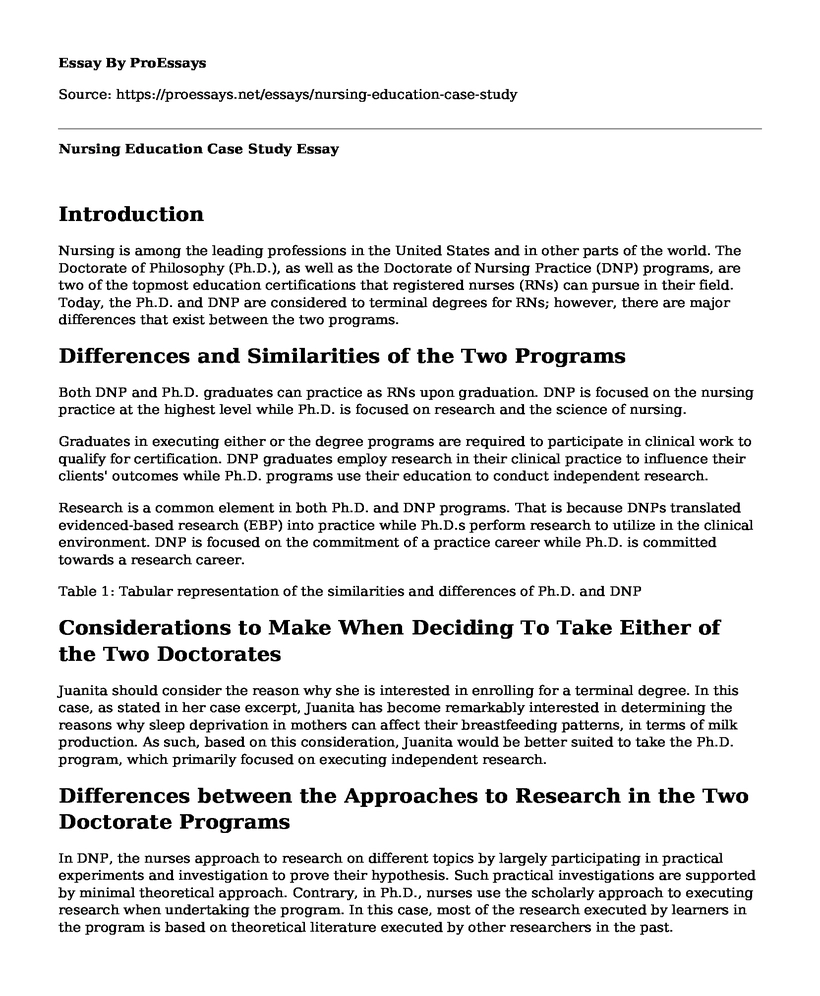Introduction
Nursing is among the leading professions in the United States and in other parts of the world. The Doctorate of Philosophy (Ph.D.), as well as the Doctorate of Nursing Practice (DNP) programs, are two of the topmost education certifications that registered nurses (RNs) can pursue in their field. Today, the Ph.D. and DNP are considered to terminal degrees for RNs; however, there are major differences that exist between the two programs.
Differences and Similarities of the Two Programs
Both DNP and Ph.D. graduates can practice as RNs upon graduation. DNP is focused on the nursing practice at the highest level while Ph.D. is focused on research and the science of nursing.
Graduates in executing either or the degree programs are required to participate in clinical work to qualify for certification. DNP graduates employ research in their clinical practice to influence their clients' outcomes while Ph.D. programs use their education to conduct independent research.
Research is a common element in both Ph.D. and DNP programs. That is because DNPs translated evidenced-based research (EBP) into practice while Ph.D.s perform research to utilize in the clinical environment. DNP is focused on the commitment of a practice career while Ph.D. is committed towards a research career.
Table 1: Tabular representation of the similarities and differences of Ph.D. and DNP
Considerations to Make When Deciding To Take Either of the Two Doctorates
Juanita should consider the reason why she is interested in enrolling for a terminal degree. In this case, as stated in her case excerpt, Juanita has become remarkably interested in determining the reasons why sleep deprivation in mothers can affect their breastfeeding patterns, in terms of milk production. As such, based on this consideration, Juanita would be better suited to take the Ph.D. program, which primarily focused on executing independent research.
Differences between the Approaches to Research in the Two Doctorate Programs
In DNP, the nurses approach to research on different topics by largely participating in practical experiments and investigation to prove their hypothesis. Such practical investigations are supported by minimal theoretical approach. Contrary, in Ph.D., nurses use the scholarly approach to executing research when undertaking the program. In this case, most of the research executed by learners in the program is based on theoretical literature executed by other researchers in the past.
Conclusion
In conclusion, today, the Ph.D. and DNP are considered to terminal degrees for RNs. Nevertheless, there exists a major difference between the two terminal degree programs for nursing. DNP is focused on the nursing practice at the highest level while Ph.D. is focused on research and the science of nursing. Also, DNP graduates employ research in their clinical practice to influence their clients' outcomes while Ph.D. programs use their education to conduct independent research. Nevertheless, the similarity between the two programs is that research is a common element in both Ph.D. and DNP programs. That is because DNPs translated evidenced-based research (EBP) into practice while Ph.D.s perform research to utilize in the clinical environment.
Cite this page
Nursing Education Case Study. (2022, Dec 18). Retrieved from https://proessays.net/essays/nursing-education-case-study
If you are the original author of this essay and no longer wish to have it published on the ProEssays website, please click below to request its removal:
- Ways to Improve the Environment for People With Dementia
- Team-Based Healthcare: Benefits & Challenges - Essay Sample
- Essay Sample on Acadia Pharmaceuticals: Pioneering Innovative CNS Therapies Since 1993
- Essay on Clinical Interviewing: Examining Intake, Assessment & Therapeutic Alliance
- Vaccination in UK - Research Paper
- Tackling Overweight & Obese Kids: Involve Parents to Fight the Challenge - Essay Sample
- Central Achromatopsia: Color Blindness in Toddlers - Essay Sample







